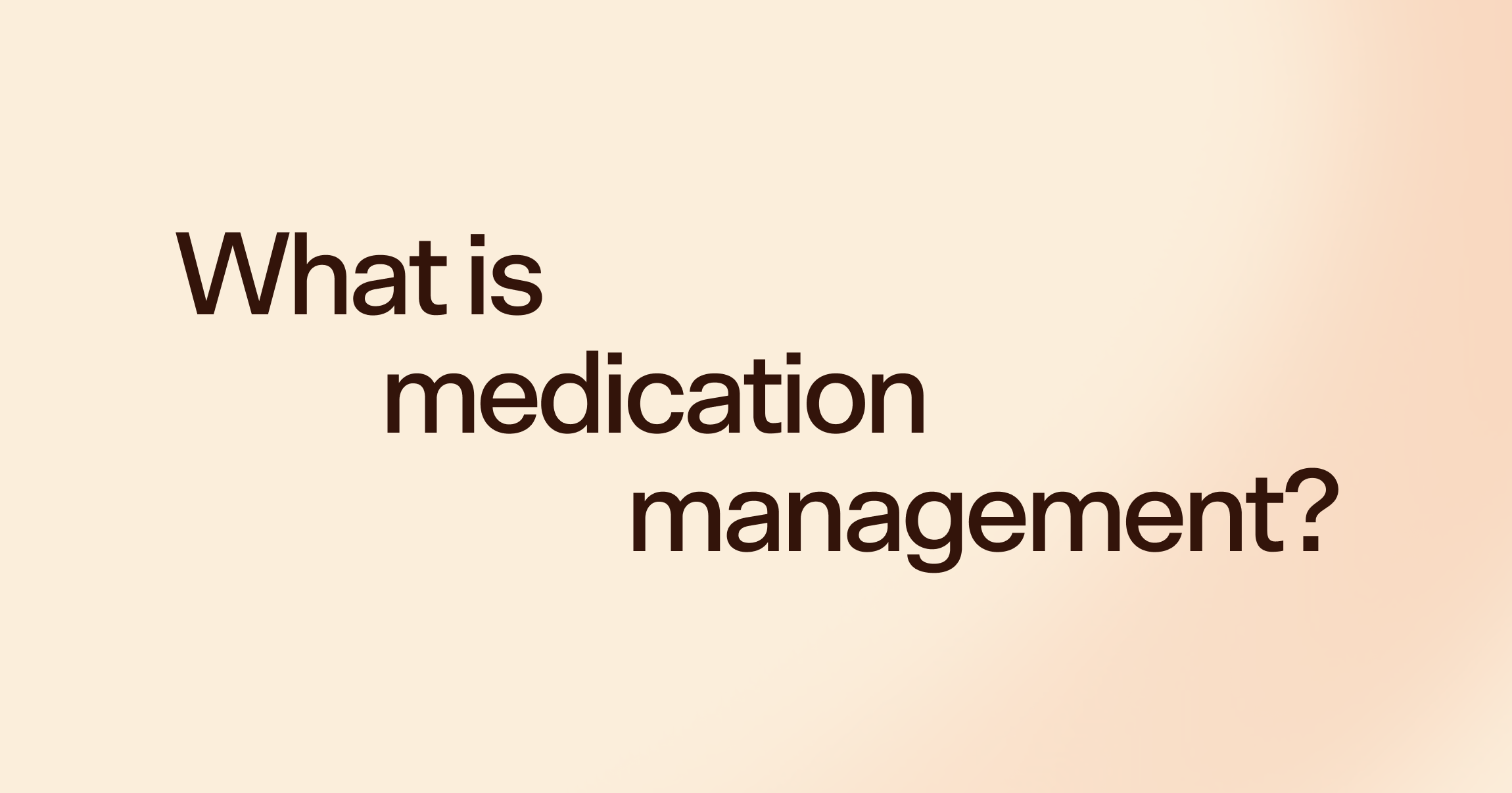Medication management means working with a provider to find and adjust the right medication for your mental health.
Medication can help with many mental health conditions and may be one important part of your overall care.
You don’t have to figure it out on your own. A psychiatric provider can help you decide if medication is a good option and build a plan that fits your needs.
Many people exploring treatment for anxiety, depression, or other mental health conditions want to understand how medication could fit into their care. Medication management in mental health means working with a provider — like a psychiatrist, psychiatric mental health nurse practitioner (PMHNP), or primary care doctor (PCP) — to find the right medication and adjust it as needed.
Medication Management isn’t just about getting a prescription. Good medication management includes regular check-ins, open conversations about how you’re feeling, and careful adjustments over time. When done well, it can help reduce symptoms, ease side effects, and support your overall well-being.
How medication can support your mental health
If you’ve taken antibiotics for an infection or used allergy medication, you know how medicine can support your physical health. Medication can also play an important role in treating mental health conditions.
Mental health medication management focuses not only on prescribing the right medication but also on making sure it continues to work well for you over time. Your provider will develop a psychiatric treatment plan tailored to your needs, which may include medication as one part of your care. They’ll check in regularly, ask about your symptoms, listen to any concerns you have about side effects, and make adjustments if needed. This process can help you feel more supported and in control of your care.
The goal isn’t for medication to be the only form of support but, rather, one piece of a bigger picture that might also include therapy, lifestyle changes, or other helpful tools. For many people, the right medication can reduce distress, make it easier to focus, and improve sleep or mood — helping you feel more at ease in your mind and body.
The care you need, when you need it
Learn how Rula can support your mental health journey
Mental health conditions that can be treated with medication
While it may not be the right fit for every condition or every person, medication can support treatment for most mental health conditions. Everyone’s needs are different, which is why it’s important to work closely with a provider. They’ll help you decide whether medication could be a good option based on your symptoms, medical history, and personal goals.
Mental health conditions for which medication is often part of the treatment plan include:
Depression: Medication may be helpful when symptoms like low mood, fatigue, or hopelessness make it hard to function. It can take a few weeks to feel the full effects, but many people find it helps lift their mood and improve daily motivation.
Anxiety disorders: If constant worry, panic attacks, or physical symptoms like a racing heart are interfering with life, medication can help. It may reduce the intensity of symptoms, making it easier to engage in therapy or coping strategies.
Bipolar disorder: Medication is often essential to manage extreme mood swings in people with bipolar disorder. It helps stabilize mood, prevent future episodes, and reduce the risk of impulsive or risky behavior.
Attention-deficit hyperactivity disorder (ADHD): When focus, organization, or impulsivity affect your work, school, or relationships, medications for ADHD can help. They may improve concentration, reduce restlessness, and support follow through on tasks.
Post-traumatic stress disorder (PTSD): For some people, medication can help manage symptoms like nightmares, flashbacks, and hypervigilance. It can also create more emotional stability so therapy feels safer and more effective.
Obsessive-compulsive disorder (OCD): Medication may be recommended when intrusive thoughts or repetitive behaviors feel overwhelming. Medication can help reduce the intensity of these symptoms and improve daily functioning.
Psychotic disorders: Conditions like schizophrenia and schizoaffective disorder often require medication as part of treatment. These medications can help reduce symptoms like hallucinations, delusions, and disorganized thinking, supporting greater clarity and stability.
Substance use disorders: In some cases, medication can help reduce cravings, manage withdrawal symptoms, or prevent relapse. When paired with counseling or recovery support, it can be a valuable part of a comprehensive treatment plan.
How to get started with mental health medication
If you’re considering medication for your mental health, a helpful next step is to talk with a mental health provider who can guide you through the process. They’ll ask about your symptoms and health history and help you explore whether medication could be a good fit.
You can also ask questions like how long it might take to work, what side effects to expect, and how much it might cost. If you’re feeling unsure, that’s completely normal. Your provider is there to help you make informed decisions about the role of medication in your life.
How long a person stays on mental health medication can look different for everyone. Some people only need short-term medication management to get through a tough time, while others may stay on it longer to help keep things steady.
Medication is often most effective when combined with other supports, like therapy or lifestyle changes. In fact, research shows that combining medication with therapy can be more effective than either approach alone for many mental health conditions. Your provider can work with you to build a treatment plan that supports your specific needs and goals.
I usually tell my patients to keep a mood journal, where they can track both their symptoms and medication side effects. This can help us work together to find the best treatment options for their unique needs.
Halee Fullerton, PMHNP-BC
Clinical reviewer
Find care with Rula
Thinking about medication for your mental health can feel like a big step, but you don’t have to navigate your mental health journey alone. A provider can help you find what works, check in regularly, and adjust your treatment as needed. Medication can be a helpful part of care for many people, especially when combined with other types of support. You deserve to feel better, and help is available.
At Rula, we’re committed to delivering a comprehensive behavioral health experience that helps people feel seen and understood so they can get back to feeling their best.
Rula makes it easier to find a licensed therapist or psychiatric provider who accepts your insurance so you don’t have to choose between affordable care and excellent care. With a diverse network of more than 15,000 providers, 24/7 crisis support, and appointments available as soon as tomorrow, we’re here to help you make progress — wherever you are on your mental health journey.
Rula's editorial process
Rula's editorial team is on a mission to make science-backed mental health insights accessible and practical for every person seeking to better understand or improve mental wellness.
Members of Rula’s clinical leadership team and other expert providers contribute to all published content, offering guidance on themes and insights based on their firsthand experience in the field. Every piece of content is thoroughly reviewed by a clinician before publishing.




